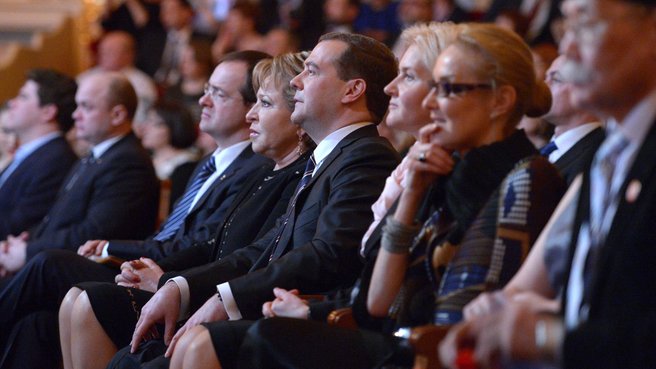Dmitry Medvedev: “Russia has given the world great music, great literature, great paintings, theatre and cinema – all things that people relate to and empathise with -- that are the fabric of human emotions. It is due to our culture that the unique notion of “the Russian soul” even emerged, as something barely definable, yet with an enormous power to unite our nation.”
Dmitry Medvedev’s opening remarks:
Good afternoon, ladies and gentlemen.
It is my most genuine pleasure to greet you all here today: people of the arts in this room whose work is known and loved by the whole world, as well as those whose daily work forms the foundation of Russian culture – the workers of Russian libraries, museums, and theatres, teachers of art schools for children -- and representatives of artistic unions who have come from every part of the country. It is a pleasure and an honour to meet you here at the Bolshoi Theatre.
First of all, allow me to congratulate you on your professional holiday, the Cultural Worker Day, which is tomorrow, 25 March, as well as on the start of the Year of Culture project.
Your outstanding talents and dedication to your creative work have helped preserve and nourish Russian culture. You are keeping it alive, preserving its classical nature and at the same time, making it modern and up to date.
It also gives one a very special feeling just to walk on this stage, which only recently reopened after renovation. The Bolshoi is a symbol of Russia’s enormous contribution to global civilisation, and this is not an overstatement.
Russia has given the world great music, great literature, great paintings, theatre and cinema – all things that people relate to and empathise with -- that are the fabric of human emotions. It is due to our culture that the unique notion of “the Russian soul” even emerged, as something barely definable, yet with an enormous power to unite our nation.
Therefore, we are trying as hard as we can to promote cultural development by investing in culture and the arts. The Government is certainly aware of how important it is to give the citizens of our unique country equal access to cultural values.
Let me remind you that in the last few years, with all the problems we have been faced with, spending on culture has not diminished, but has actually grown. We are determined to continue along these lines.
The Government adopted a special programme to develop culture and tourism in Russia, which involves, among other things, a gradual pay rise in culture-related industries and the improvement of facilities and equipment at museums, theatres, libraries and other such institutions. We will continue doing so even despite the current economic difficulties. You know that problems never end, and if we used them as an excuse, we would never be able to invest in culture, and it would remain backwards forever. So we will continue along this course. I am also pleased to inform you, especially from this stage, that 10 more theatres have opened in Russia’s regions over the last two years. Isn’t that great? This is an important achievement.
The Opera House in Mari El will reopen this year, as well as the Small Hermitage Museum in St Petersburg. Renovations will be completed at the Monastery of St Ipaty in Kostroma and the arsenal building at the Nizhny Novgorod Kremlin, as well as at many famous manors around Russia. Kirov will have a new children’s centre. These are but a few examples of the work being done, but I certainly had to cite them here because our culture – our vast Russian culture – spans from Moscow and St. Petersburg to every corner of our vast, unique country.
Our immediate plans include completing an opera house and a puppet theatre in Yoshkar-Ola, a folk art house in Kyzyl and a circus in Penza. In 2015, we plan to build five more culture centres in various cities. This is a very recent concept -- multifunctional culture centres -- and we hope that they will make a real difference. There is a long-term plan to develop 50 such centres.
Another important issue I have to bring up is the ongoing Government support of rural culture institutions. Last year, we awarded monetary prizes to the 1,000 best institutions. We also gave personal awards to 1,000 workers of these institutions who are present here in this hall. It was the first time we did it, and it is certainly a good practice, because it is best to provide targeted support.
I very much count on 2014, as the Year of Culture, to determine our further course, even if we do not see any breakthroughs. We have found the money to fund the project, which is actually quite expensive, although not ridiculously so – 3 billion roubles -- and the bulk of that will go to support culture projects in small towns. The best exhibitions, theatre productions, gala shows and films shown in Moscow and St. Petersburg will certainly be taken even to the most remote regions of Russia in the course of this year-long project. This is not going to be easy, considering our country’s size.
It is my hope that the Year of Culture will contribute to the goals I spoke about. It will feature over 200 events designed for professional as well as broad audiences.
I would like to thank everyone who participated in preparing the Year of Culture project. It is gratifying to have such events designed and implemented at a high, professional level. I wish you all success, creative inspiration and all things good. Please accept again my holiday greetings. Good luck to you all.












